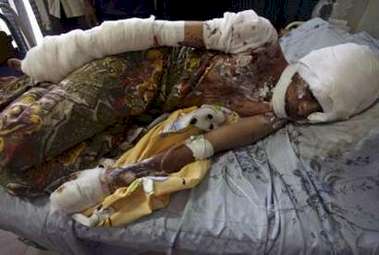The Al-Ula Market Bombing
| Saturday's bombing of the Al-Ula market in Sadr City followed by today's three bombings in Karrada, demonstrate Al-Ula is large, very busy, and very crowded, and is known throughout Baghdad as a place where you can buy everything from household goods, to eggs. The range of goods on sale both at the stalls and in the surrounding shops is such that many people come there from outside of Sadr city. On a Saturday morning it would very crowded with shoppers on a severely limited income looking for bargains. In present-day Iraq that means that many of them were women and children. Accounts differ as to exactly how the bombing was carried out. Some witnesses say that the bomb was contained in a parked van, while others maintain that it's driver tried to drive it across a central reservation the better to target a police patrol. All agree that the market was packed and that massive civilian casualties were inevitable. This report from Asharq Al Awsat quotes witnesses as agreeing that had the bomber succeeded if the crossing the island of the central Street and entering the market proper that the number of victims would have been much greater. The bomb itself was very large. It devastated a swathe of stalls, cars, and buildings in the square in which the Al-Ula market is located and was sufficiently powerful to blow some of the dead and injured two storeys into the air. At this stage it is difficult to say exactly how many people were killed and injured by the bomb. Asharq Al Awsat puts the number killed at 68, others say 74 with more than 200 wounded many of those injured are in a serious condition and are not, at the time of writing, expected to survive. Most of the victims were taken to the Imam Ali hospital in Sadr city in the familiar combination of ambulances, taxis, and private vehicles. The reaction (and recriminations) were immediate. Sadr city which is located in East Baghdad is one of the poorest and most crowded areas of Baghdad. Unemployment is very high even by the standards of American occupied Iraq and many of the streets and buildings are in a state of severe disrepair. As might be expected from the name Sadr City it's a stronghold of Mehdi Army militiamen loyal to Muqtada al-Sadr and as such has often been targetted for bomb attacks. Until very recently Mehdi Army militiamen operated checkpoints and would search vehicles entering the area. Unfortunately at the behest of the American military the Interior Ministry insisted that this cease, while at the same time Major General Jihad Taher al-Luaibi the officer in charge of the anti-explosives division in Baghdad has repeatedly complained that his men have not been given explosive detection equipment. These facts which were already widely known, have caused considerable resentment amongst ordinary residents and militiamen alike. Tensions between residents, the militia, and the occupation were unusually high already due to what appears to have been a planted story that appeared on Friday (hastily retracted by US army spokesman Major General William Caldwell) that American troops had rescued three hundred hostages from the clutches of the Mehdi Army during a raid on either on the health ministry itself or at various locations in Sadr city depending on which version of the story you read. Accordingly when American troops appeared at the bomb scene they were forced to beat a rapid retreat by an infuriated stone-throwing mob who, not unreasonably under the circumstances, were of the opinion that this particular bombing was a reprisal attack and blamed the planted story for being the provocation. There have been several demonstations in Sadr city today by no means all of them organised by the militia demanding that the milita be given responsibility for manning checkpoints and that the police be properly equipped. These demonstations are in addition to many funerals and come on top the political storm caused by other bombings and kidnappings today. ends markfromireland |

 The force of the explosion was such that some of the victims' bodies were blown two storeys into the air and had to be recovered by residents.
The force of the explosion was such that some of the victims' bodies were blown two storeys into the air and had to be recovered by residents.